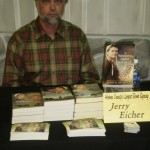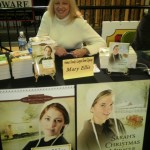Jerry, many of our readers may be unaware that you actually grew up in the Amish community. Which Amish Order did you belong to? How long were you a part of the Amish?
Our senior bishop Wallace Byler steadfastly declared us to be Old Order Amish, but the rest of the Amish world called us the New Order Amish. From what I understood, the designation came out of an Amish revival movement from Holmes County in the sixties, and involved only a small number of Amish communities.
My wife and I were born, baptized, and married in the Amish faith. We left just before the birth of our second son, Brandon.
Why did you leave?
I was idealistic, zealous for truth, and acquired ideas which the elders thought dangerous. I read George MacDonald’s Curate’s Awakening, in a translation by Michael Phillips, I believe. I also studied Galatians, coming up with my own ideas on how their Ordungs Brief (a set of written rules) didn’t quite have Scripture to back it up.
To say the least, they weren’t pleased (they being the two bishops, three ministers, and a deacon who gathered at my house). I chose to join the Mennonites before I got in real trouble. By the time the dust settled, both sides of my wife’s and my family had also left, all fourteen of them.
Was it difficult to adapt to the “outside” world?
For me it was, perhaps because I hadn’t planned on or dreamed about leaving. When I drove my first car into the driveway, a Ford Escort, stick shift, diesel, the last year Ford made such a vehicle, I felt a great cloud of heaviness. It was perhaps what a man might feel who leaves on a long journey, certain he will never return home.
The lost of identity was severe. If you are Amish, you may not know much else, but you do know you are Amish. It’s confirmed daily, wherever you go, by your dress, by your lack of an automobile, and your ability to speak another language. Suddenly, all that is gone.
What are some of your fondest memories from growing up Amish?
I grew up in Central America, in an Amish outreach community co-founded by my grandfather, Peter Stoll. So, my childhood memories are laced with the love of that culture. It was not until my mid-teen years that I got the full dose of Amish culture when we moved back to the States.
The camaraderie of the youth group drew me in immediately. To belong, to be accepted without judgment, to know who you were, was a delightful experience.
We were involved in group activities, popcorn raising, corn husking after dark, volley ball, a version of quilting, all of which allowed for healthy interactions between boys and girls trying to find their way into adulthood.
There’s nothing like the experience of driving a fast horse home from a hymn singing―especially in the summer time, with your girlfriend. The visibility is low, as a buggy doesn’t have regular lights like a car. Your door is open, maybe the storm front is up, and you are close to the surrounding environment. Everything goes by twice as fast. Then you pass a few buggies. A horse has no steering wheel or brakes, just the lines taut in your hands. I have never raced a car, because I don’t need to. I’ve already done something better! The sad truth, though, is that my wife noticed my horse before she ever saw me! Who says girls aren’t the same everywhere?
Do you think people tend to romanticize the Amish lifestyle? How accurate are the portrayals of the Amish that we see in books, movies, and television?
I think I just romanticized in some of my answers! It probably can’t be helped, thought’s built into the lifestyle. My novels aren’t romanticized―at least that I know of. I just follow what interests me.
As far as accurate portrayal in books and films, most come close with some mistakes scattered throughout. Take for example the movie For Richer or Poorer, which our family loves.
I doubt the grandpa would have come barging into the bedroom at five o’clock in the morning, or whatever time it was. It was very early at least! Amish are better mannered than that. I’m not aware of any Amish plowing with one horse either, but it did make for a good plotline. Then there was the adult dancing. Perhaps some wild young people dance in their rumsprigha days, but never adults. The worse deviation from the authentic was when the New York lady puts on the Amish fashion show for the ministers. That would never happen!
In your opinion, what are the biggest misconceptions people have about the Amish?
That they are perfect people. That outsiders can never be anything like them. All of us could be a little Amish, if we wanted to. Turn off the distractions some evening. Stay inside the house, curl up with a good book, get out your favorite board game, and surround yourself with silence, low lights, and conversation.
Do you strive to keep your novels true to Amish traditions and culture, or do you take more artistic license?
I try to keep them authentic. I stick procedurally to the Amish way of life. On plot lines, I often ask myself, Is this possible? That is, I consider whether what I am writing would be permissible under the restrictions of an Amish lifestyle.
Are any characters or events in your novels based on real people or events?
No. I did that with my first novel, but not since. It’s much too restrictive, and I worry about how the real person or people would feel or react. My characters are now fictional.
What is your favorite thing about the Adams County Trilogy?
I would say my favorite thing is the depth of emotion felt by the characters―by Rebecca in the first book, John in the second, and to some extent by Rachel throughout. Rachel loves the wrong thing, but she loves.
Then there is the delight of discovery. Maybe I notice it more because this is my first true series, but I think the wonder continues with each book.
Rebecca and John would have been just another Amish boy and girl who fell in love, if it were not for the cast of characters surrounding them. They are the ones who bring out the extraordinary in this couple. There’s Atlee of course, and Rebecca’s aunt Leona. Rachel and Luke add drama and color of another sort. And then in the final book, Emma’s secret overshadows them all.
Filed under: Amish Fiction, Jerry Eicher by AmishReader.com
5 Comments »




